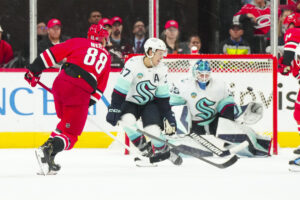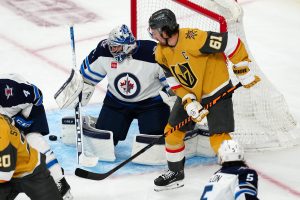Post-season heroes come in all forms from the star player to the unknown fourth-liner. We all know the exploits of the great playoff performers. However, we hardly hear about the unlikely playoff heroes. These unlikely post-season stars can contribute in many ways. Contributions could be for an entire playoff run, a series, a game, or even a goal. These unlikely heroes have made big plays that no one expects. This series looks at all of these unknown stars. These are the unlikely Vancouver Canucks playoff heroes.
Vancouver Canucks Playoff Heroes
It’s a bit of a trick to find unlikely Vancouver Canucks playoff heroes, even after 50 years. The heroes are there, don’t get me wrong! Ryan Kesler putting the team on his back when Daniel Sedin and Henrik Sedin were so effectively blanketed by the Nashville Predators in 2011. Pavel Bure in double overtime against Calgary Flames to cap the three-overtime game’s comeback of 1994. Gary Monahan’s game-winner against the Montreal Canadiens in 1975 for their first playoff victory in team history. Problem is, all these guys were more or less expected to perform. Scorers scoring is kind of the opposite of “unlikely” so…
Fortunately, there’s one aspect of the Canucks that have surprised their fans over and over again. Not always for the better, granted, but in these cases? A delight!
Richard Brodeur
Before the Run
Finding a 5’7″ goaltender in the NHL is a joke nowadays, but Richard Brodeur had a solid career in the WHA before that league was incorporated into the NHL. He went to the New York Islanders, only to be stuck behind Chico Resch and Billy Smith. He played two games in the 1979-80 season, so was flipped to the Canucks. “Kermit” played very well for Vancouver, and in the year of their first Stanley Cup run in 1982, he had a .893 save percentage and 3.36 goals-against. That might not sound great but bear in mind that season only one goalie who played more than ten games had a save percentage over .900. So he was good, if not great. Solidly top-10.
The Crowning of a King
The Aftermath
The Canucks had faced some scoring stars on the way to the Final, but the Islanders were something else. Five Hall of Fame players on a team winning their third of four straight Stanley Cups brought Brodeur and the Canucks back to earth in four straight losses. Even so, Brodeur’s run was remarkable. Despite playing one fewer game than Smith, he faced down 96 more shots and made 94 more saves. It’s easy to picture him turning to art post-NHL career.
Before the Run
Another middle-of-the-pack Canucks team, another shocking run by a Canucks goaltender. This time is was Kirk McLean between the pipes, after a season with a .899 save percentage. That was… not great. For goalies who had played more than 20 games, McLean was 31st in the league. Now, his team did him no favours, and he still had better numbers than backup Kay Whitmore. But not a lot was expected of the 1993-94 Canucks when they snuck into the playoffs with 41 wins in 84 games.
Oh, Captain! My Captain!
The first round was against the Flames, who had finished a dozen points ahead of the Canucks. That number was a bit of an illusion, though, as they only had one more win to go with ten more ties. “Captain” Kirk’s Game One shutout served notice, though the next three games were losses. Each of those games was tighter than the one before, though, and by Game Five McLean and the Canucks were in Dramatic Hero mode. Three overtime games in a row, including a double-overtime Game Seven, solidified McLean’s legend. Next came the Stars, who McLean welcomed with another shutout and a .940 save percentage, beating them in five. Five games were all Vancouver needed to beat the Toronto Maple Leafs in the Conference Final, this time with two shutouts and a .947 save percentage.
The Aftermath
Up against the best team in the league, here is where the Vancouver Canucks playoff run ended. But McLean’s 52 saves in a Game One win let them know it wasn’t going to be easy. It would take the New York Rangers the full seven games to get their win, and McLean finished the series allowing just one more goal than his counterpart Mike Richter. Through the playoffs, he played one more game than Richter, but faced 197 more shots and made 187 more saves. McLean, alas, would never get that close again, playing a total of 12 more playoff games in two seasons before retiring after the 2001 season.
Roberto Luongo
Before the Moment
Yes, the previous two were about the Canucks’ first two Stanley Cup Playoff appearances. And while Roberto Luongo was an architect of the third appearance, that is what he was acquired for. And while he did excellently – including two 1-0 shutouts in the Final – he was also one of the best goaltenders in the league. He had 34 games of playoff experience and had just won the Jennings Trophy that year with Cory Schneider. A better choice would be his first-ever playoff game, where he disappointed – right until he didn’t.
The Canucks hadn’t had a star in net since McLean and hadn’t had a goalie of this level ever. They paid a price for him, including All-Star Todd Bertuzzi, but they were a good team with a glaring weakness in net. The Florida Panthers had an excellent goaltender who had yet to see the playoffs after six seasons. Luongo could be the solution the Canucks needed… or he could fold in the added pressure. They’d find out that year.
The Big Debut
In the 2006-07 regular season, the Canucks fought the Minnesota Wild for the top spot in their division, winning it by a single point. Their “reward” was to face the 50-win Dallas Stars in round one. Luongo had faced Marty Turco three times that year and Mike Smith once. All four of those games ended 2-1 with each team getting one win in overtime and one in regulation. That the series went seven games isn’t a surprise, nor that the two teams scored 12 and 13 goals by the end. Game One, on the other hand, was a shocker.
Amazingly, the teams were tied at four goals apiece after regulation – as many as any two regular-season games combined. Luongo looked like he was… good. Not the regular-season levels of greatness he managed in his first year with the team, but good. It was hoped he would express years of frustration at not making the playoffs by getting a shutout in his first-ever game. So he did.
For three overtime periods, Luongo stopped everything. He faced down a 3-on-5 penalty kill in the second overtime. He came within one save of Kelly Hrudy’s then-record number of saves in an NHL playoff game. After giving up four goals in his very first playoff game, Roberto Luongo finished five hours later with a .947 save percentage, allowing those four goals on 76 shots.






